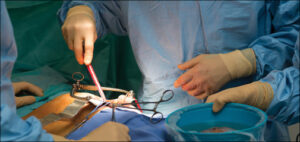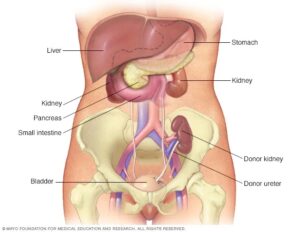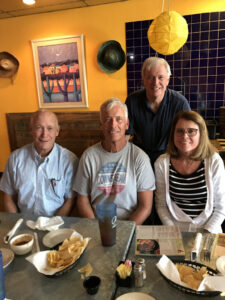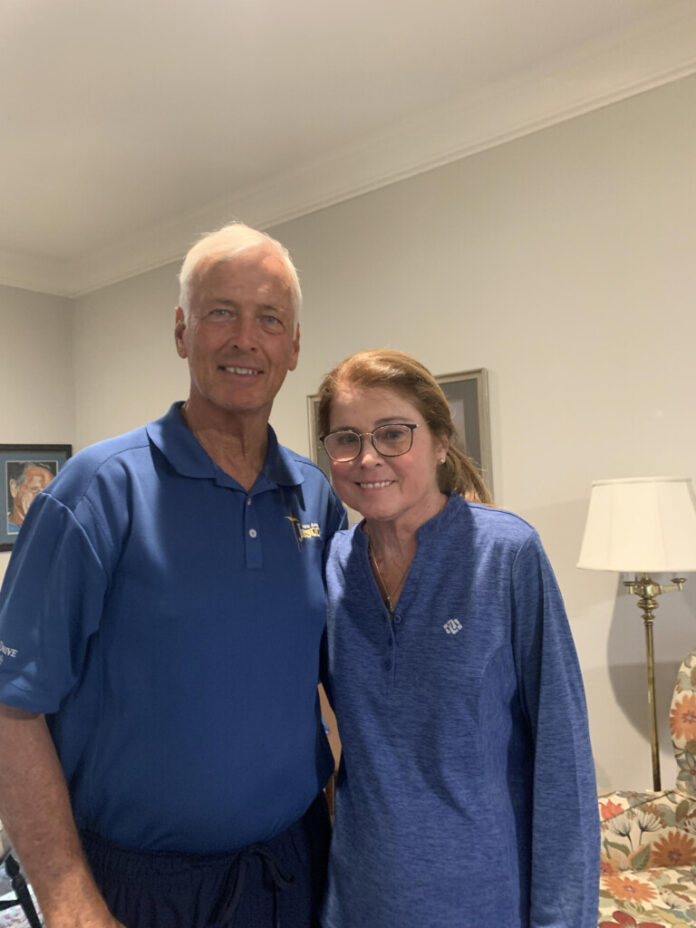“For the two or three weeks leading up to the procedure we just knew there was a scheduled date, we knew that the donor was available and had passed all the tests, and that was it. So, he didn’t tell any of us even until well after the procedure. So finding out after the fact was kind of a hard thing to describe, the feeling of gratitude for someone making such a sacrifice.” — TJ Howard ’08
In December of 2021, Coach Koch, our athletic director, donated his kidney to his sister Kacy Howard, mother of Mr. Joe Howard ’04 and Mr. TJ Howard ’08.
By donating his kidney to someone in need, Coach Koch performed one of the greatest selfless acts a human can make by giving something of his to someone in need. By donating his kidney, Coach Koch is an example to anyone who feels the need to help people in medical need by giving them the option of donating an organ to a person in need. While the act of donating a kidney is an amazing gift, what is equally amazing is the medical procedure itself.
We didn’t know beforehand; he kept it a secret; all we knew was that there was a match, that there was a person who had volunteered to do this. — Joe Howard ’04

Kidney Transplantation
The first kidney transplant surgery was performed in 1954 by Dr. Joseph Murray and Dr. David Hume at the Birmingham Hospital in Boston. This first step involving organ transplantation has led to a vast array of new techniques and discoveries, such as, the ability to transplant a kidney from a deceased donor and the creation and FDA approval of new anti-rejection medicine. These are just a few of the many brilliant discoveries that have enhanced this life-saving procedure.
It happened to be on her birthday last year when she went in to get the transplant, and the whole family was gossiping; we were all trying to figure out who this mysterious donor was. Then after the operation was a success, and Steve was sure that was she OK, that’s when he came to visit her in the hospital and let her know that it was him. I happened to be at the hospital when he came, and it was really awesome. She got very emotional, we all got very emotional, and it was really awesome. — Joe Howard ’04
Kidney transplants are more common than they used to be; the number of people waiting for transplants is also increasing. The rise in diseases such as diabetes, high blood pressure, chronic glomerulonephritis, and Polycystic kidney disease, leaves patients with two choices for treatment, either a lifetime of dialysis treatments or to have a kidney transplant. The benefits of a kidney transplant compared to dialysis are better quality of life, lower death risk, and fewer dietary restrictions. While kidney transplants are generally the best option for chronic kidney diseases, some patients are too unhealthy to undergo the surgery, leaving dialysis or death as their only option. Additionally, living donor kidney transplants are preferred because of a better chance for a longer life expectancy after the surgery, less risk of complication, and there is no wait time for a deceased donor kidney to be ready. Lastly, for any donor to be viable for transplant candidate, they must have the same blood type as the patient and undergo many health screenings to see if the kidney will not be rejected.

Interview
To get the amazing story of how the kidney transplant occurred, I interviewed Coach Koch, Mr. Joe Howard, and Mr. TJ Howard.
Coach Koch
What caused your sister to need a kidney transplant?
She just had health issues that caused kidney failure, and after the kidney transplant she found out she had this other disease that affected her heart and her intestines and then the kidney. So, it was because of [the transplant] that she found out what ultimately was the cause of it. I don’t remember the name of the disease, but it affects the heart rate of your heart and she had had a stroke before the kidney transplant and then she was having issues with it. This heart disease starts attacking the kidney.
When was the transplant performed, and how long was the recovery for you and your sister?
It took me about four to six weeks to get fully recovered and my sister probably a couple of months. Even for any kidney [doctors] constantly regulate the anti-rejection medicine so that’s an ongoing process that will go on for years to regulate medication. So she’s back up on her feet after a couple of months, constantly regulating the medicine.
What was the process before the transplant for you to donate your kidney and for her to receive the kidney?
We both had to go through extensive testing of blood work, health questions, and cardiovascular testing, and I had to get on a treadmill and all of that was just to see if I was healthy enough. I was the correct blood match, and she had to do a lot of similar type tests, EKG sonograms just to look at the kidney to see if it will take the new one. The main thing for me was my blood type and my body mass index to qualify for donation.
Does your sister still have ongoing medical treatments, since the surgery?
She still goes weekly and hopefully eventually goes monthly and then every other month for the anti-rejection medicines. That’s all that looks like it’s going to be for the follow-ups, and then I go at six months and then every year to check my one kidney.
Do you think you would ever donate your kidney if it was not for your sister?
Yeah, a couple of years earlier I tried to donate to a cousin but she got to the point where she did not qualify health-wise. We missed the window of opportunity for her and so I kind of knew I am a strong candidate. So then when my sister came along and needed it, I knew at my end I was probably a strong match for her. Would I have done it for someone else, yes, now especially, and going through the process and my age I’m like why wouldn’t somebody save someone else’s life when they get the opportunity? I’m back to a fairly normal life and the doctors say I should live to my 90s without any kidney issues. And there are a lot of people just waiting for a kidney.
You can go to any dialysis center and just see the people waiting for a kidney. My sister was going in three times a week, and the day you do dialysis it wipes you out and then you start feeling better, and then you have dialysis again. That was Monday, Wednesday, and Friday, so by Sunday she was having a good day and then the cycle start again Monday. So Monday to Saturday she was pretty exhausted. Now it might have been her health condition and other dialysis patients don’t have it as bad.
The recovery from the research I did said the recovery for you as the donor was one to three days in the hospital and then 2-3 weeks before you go back to work. Was there anything different for you?
That is pretty accurate. We did it right before exams last year, so I had all of December pretty much to recover before school started back up in January.
With recovery for you and your sister, were there any dietary changes you both had to make?
Not really, they stressed drinking fluids and keeping one kidney good and flush. I drank a lot of water and fluids and I did prior to that to make sure that I do not get dehydrated. Not that I know of for my sister. Kind of the same thing, drinking a lot of fluids and eating as healthy as she can to keep her body as healthy as possible.

Mr. TJ Howard
How did COVID take a toll on your mother, and what was the process for her during COVID?
Because of her health, she was stuck at home more than anyone else, so it was taking as little risk as possible. So with that kind of condition, it left her, in basically two years of isolation. So I think mostly it was just like a psychological impact, but then being stuck at home, there are obviously other physical downsides because you’re being less active throughout the day. So I’d say there were a lot of difficult things for everyone, but I think loneliness was probably the biggest.
Was there anything that you or your family members had to do to help her throughout the process, like during dialysis or after the transplant?
Yeah, so she needed to be transferred to dialysis three times a week, and so just finding ways to help get her there. Because it took such a toll on her, it drained her every time she went. Helping to get her back home was also necessary because the dialysis place was also very restrictive because of COVID and so nobody could be there with her in the room at all during the 3-4 hours that she was in there getting her treatment.
Were there any dietary restrictions that she had to have during dialysis and then also after the transplant?
Yes, during dialysis there was basically a list of foods that they said were absolutely a “do not eat these” because being this stage four chronic kidney disease, certain foods are just worse for the kidney. It was tough because there are times when they’d say well you will feel really nauseous, you will feel really sick from this treatment, and it takes a toll on your body. So you got to make sure you’re eating enough, but also don’t eat all these things because these things are not going to help and so she was for sure on a restricted diet before it got better. After the kidney transplant, there were still certain things that she’s got to be careful about.
What was it like knowing that Coach Koch was going to be her donor and what was your appreciation for him?
So, we didn’t know beforehand, he kept it a secret all we knew was that there was a match, that there was a person who had volunteered to do this. So, for the two or three weeks leading up to the procedure we just knew there was a scheduled date, we knew that the donor was available and had passed all the tests, and that was it. So, he didn’t tell any of us even until well after the procedure. So finding out after the fact was kind of a hard thing to describe, the feeling of gratitude for someone making such a sacrifice.

Coach Koch and Kacy Howard with other family members.
Mr. Joe Howard
Do you know exactly what caused your mom’s condition to start her illness?
I don’t know really; I don’t know if anybody really knows what caused her kidney failure. She had kidney issues for a while and had already been seeing a kidney doctor. I guess it got to a point a couple of years ago the doctors had been monitoring her kidneys and they realized the kidneys got below a certain threshold. So, she began kidney failure and started dialysis. So, around November 2019 she started doing dialysis.
Were there any problems with COVID she had to l worry about since she was in kidney failure?
Absolutely, so COVID really was a major challenge because, as I said, dialysis started late in 2019 and when you’re on dialysis it’s a very difficult to process, it puts your body through a lot. So she was one of those people that was considered a very high risk, she had to go to dialysis three days a week pretty significantly, and when COVID hit a few months later everyone had to keep away from everyone, but my mom especially had to be very careful and we had to be very careful about being around her. So, for probably longer than most other people my mom was very isolated because no one could really be around her without putting her at risk.
Is there anything that she must do after the surgery that is like dialysis or anything she has to keep on doing to stay healthy?
So yes and no. I think a lot of people commented just how quickly she seemed to improve after the transplant. We hadn’t realized how much of a toll dialysis had taken on her because she had been on dialysis for over two years at that point. It was kind of a slow degradation and as soon as you get the transplant her recovery was so fast, and she just looked healthy in a way that we didn’t realize she didn’t look healthy before. She had color back in her skin and she had energy and appetite, which she didn’t really have a lot of during her time on dialysis. So, the recovery was very quick and she seemed like an entirely new person. In fact, I think she came out of the surgery with a new lease on life in a lot of ways. She had lost a lot of hope in a lot of things and enthusiasm during dialysis. Now, immediately after the transplant, for a few days, there was definitely some pain and some adjustment involved and the scarring had to heal.
So, she was still in the hospital for a while, and they monitored her very closely to make sure that the new kidney would start working. But once they were confident that the new kidney was working, they released her to go home. But anyone with a kidney transplant will continue to go back to the transplant center on a regular basis to be monitored and tested, she has her blood tested pretty regularly.
Early on it’s a couple of times a week, and then they’ll move to maybe once a week and then once every couple of weeks. So the further away she gets from the transplant the more they will spread those appointments out. But, they’re still going to keep on monitoring and making sure the kidney is still working and adjusting all of her medications that she needs to take because she has to take several different anti-rejection medications in addition to any other prescriptions that she has. They want to make sure that all of that is balanced properly I guess in perpetuity, forever.
What did it mean to you for Coach Koch to give one of his kidneys to your mom?
I mean we were kind of blown away and shocked. When my mom first went on dialysis, we tried as quickly as we could to figure out what the transplant options would be, and I know several people got tested, myself included, to see if we could be potential donors for her. For whatever reason, various people were ruled out throughout the process, and we got to a point where we hadn’t heard anything for a while, partly because of COVID, and the transplant center shut down for a while. Then we just weren’t sure, we hadn’t heard anything, we weren’t sure if she even had a potential donor lined up and so you know come mid-fall 2021 she was on the transplant list hoping for a donor.
At that point, we were thinking it was going to have to be like a stranger or something because we figured everyone that we knew would have been tested at that point, but I guess the doctors were just working their way through the process and found out that Steve (Coach Koch) was a good match for her. They called her, I feel like it was October or November last year, to let her know they found a match, but they wouldn’t tell her who it was, and they scheduled a date.
It happened to be on her birthday last year when she went in to get the transplant, and the whole family was gossiping, we were all trying to figure out who this mysterious donor was. Then after the operation was a success, and Steve was sure that was she OK, that’s when he came to visit her in the hospital and let her know that it was him. I happened to be at the hospital when he came, and it was really awesome. She got very emotional, we all got very emotional, and it was really awesome. I think that it has transformed her relationship with him in a way, she’s of course so grateful to him and all of her children are so grateful to him, but I think it just cemented for her just how much he means to her, and what an amazing brother he is to her.
Conclusion
Coach Koch’s life-saving story illustrates how anyone can make a difference in someone’s life. That difference can come in the form of something small or as complex as giving a kidney to a loved one. Additionally, Coach Koch demonstrates how important a family relationship is and how it lasts forever. Lastly, Coach Koch exemplifies the Jesuit teaching of being a ‘Man for others,’ inspiring many people with his great selfless deed.
To get more information on the research I did, look at these websites:
Mayo clinic






